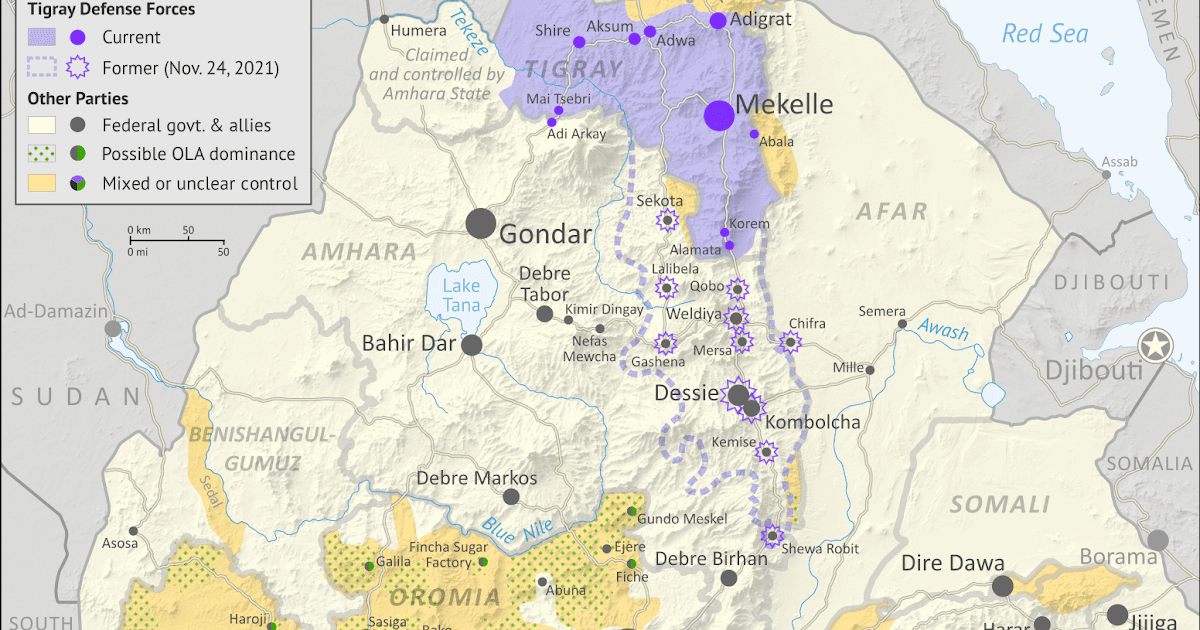
Ethiopia War Map: Tigray Rebel Advance on Capital & Control Today (Nov. 2021/Jan. 2022)
Tigray rebels nearly reached Ethiopian capital Addis Ababa in late 2021, but have since been pushed back.
Follow along with the video below to see how to install our site as a web app on your home screen.
Note: This feature may not be available in some browsers.

At least 19 people have been killed in Sudan’s restive Darfur region in the latest violence between rival groups that has left dozens dead this week.
Fresh clashes broke out on Thursday between armed groups in the rugged Jebel Moon mountains of West Darfur state, close to the border with Chad.
At least “19 people were killed and five wounded”, said Adam Regal, spokesman for the General Coordination for Refugees and Displaced in Darfur, an independent aid organisation.
He earlier reported “dozens of injured and missing” as well as “four villages completely burned”.
https://www.theguardian.com/global-...fur-revisiting-those-orphaned-by-the-conflict
Regal accused Janjaweed militiamen – many of whom have joined the feared paramilitary Rapid Support Forces, commanded by Gen Mohamed Hamdan Daglo, the de facto deputy leader of Sudan – of taking part in this week’s fighting.
“Militias have been attacking the villages of Jebel Moon, setting fire to houses and using automatic rifle fire since Sunday,” a tribal leader said. “No government forces have arrived since the attacks on Thursday and we are terrified of an attack at any time.”

A video posted on social media showing armed men burning a man to death in western Ethiopia has drawn condemnation and renewed fear over increasing horrific incidents of ethnic violence.
Eleven people, including nine ethnic Tigrayans, were killed on 3 March in the Ayisid Kebele of Metekel zone, in the Benishangul-Gumuz region where waves of ethnic violence over the last year have killed hundreds of people.
Ten of the people were shot dead while the 11th, a Tigrayan man, was burnt alive according to the Ethiopia Human Rights Commission (EHRC). The commission said the “extra-judicial killings” were carried out by Ethiopian forces and other armed groups according to its investigations.
In clips from the graphic five-minute video which emerged on social media on Saturday, more than 50 armed men, including from the Ethiopian army, are seen carrying a man in plainclothes towards a charred, burnt out heap, where it appears people had already been burned.
After lobbing insults at him, they throw him on to the heap, adding branches, wood and grass to reignite the fire. According to researchers, the men spoke Amhara and some are from the Amhara militia group, Fanos, a regional ethnic militia group that has been fighting alongside Ethiopian forces according to several reports, during a bloody, on-going conflict between Ethiopia and the Tigrayan People’s Liberation Front, in the north of the country.
In a statement on Sunday the EHRC said, “the act of burning bodies and a person into death was perpetrated by members of government security forces and the involvement of other people and the action was an extra-judicial killing.”
The killings happened after government forces and other armed groups responded to attacks that occurred the day before, when 20 government security force men and three civilians were killed by militants in the restive area. The following day, government forces conducted widespread searches, and intercepted a bus full of either Tigrayans who had just been freed from detention.

The head of the World Health Organization (WHO) has urged the world not to forget the humanitarian crisis in Tigray, saying that even amid the war in Ukraine there is “nowhere on Earth” where people are more at risk than the isolated region of northern Ethiopia.
Dr Tedros Adhanom Ghebreyesus, WHO director general, is from Tigray and has incurred the wrath of the Ethiopian government in the past after accusing it of placing the region under a de facto blockade. Prime minister Abiy Ahmed’s government has accused him of bias, and of spreading misinformation.
At a press conference in Geneva on Wednesday, Tedros implicitly addressed those concerns. He said such was the scale of the crisis, it would be a dereliction of his professional duty not to speak out.
“Yes, I’m from Tigray. And this crisis affects me, my family and my friends very personally,” he said. “But as the director general of WHO, I have a duty to protect and promote health wherever it’s under threat. And there is nowhere on earth where the health of millions of people is more under threat than in Tigray.”
Alluding to the Russian invasion of its neighbour, he added: “Just as we continue to call on Russia to make peace in Ukraine, so we continue to call on Ethiopia and Eritrea to end the blockade, the siege, and allow safe access for humanitarian supplies and workers to save lives.”
The UN has been unable to get emergency food supplies into Tigray since mid-December. And while in recent weeks medical supplies have started to trickle in, after a six-month hiatus, the WHO and doctors on the ground have said the amount arriving is nowhere near enough to meet the needs of the population. Often there is not enough fuel to get supplies to where they need to go.

As the conflict in Ukraine progresses, some are wondering about Russia’s activities in Africa, particularly by the mercenary Wagner Group, known for its flashy entrances into conflicts and Russia’s tight-lipped claims that it does not exist. Some in the international community have concluded that Wagner is the vanguard for a Russian scramble for Africa.
This is not the case. Turning Russia into a boogeyman for Africa’s woes and treating African nations that partner with them as co-conspirators undermines the sovereignty of African countries and deprives African civilians of the international support they need during security crises. Russia’s harmful but geopolitically modest ambitions for the continent should be understood on their own terms instead of framed as a great power competition. Most importantly, efforts to counter Wagner need to acknowledge why they were there in the first place.
Since Wagner’s 2017 entrance into the Central African Republic, or CAR, the group has been involved in several high-profile conflicts across the continent, from the Libyan civil war to the fight against ISIS in Mozambique to Mali’s counterterrorism efforts. Wagner promises no-strings-attached security assistance in exchange for payments or natural resource concessions. It’s an enticing deal for African leaders, particularly those who feel efforts by the international community are insufficient to their security needs.
Wagner’s activities are opportunistic. Wagner entered CAR and Libya because they were longstanding unresolved civil conflicts, and they were in Mozambique and are entering Mali because of unsuccessful counterterrorism efforts. Wagner saw opportunities to make money from conflict and Russia sees opportunities to wrongfoot competitors like France and give the appearance of restoring the Soviet Union’s footprint in the developing world without the associated investment. Rather than being part of an orchestrated campaign to establish Russian influence in strategic locations, where Wagner will go next is simply a question of whose need for mercenaries is most dire, and what nations the international community has failed.
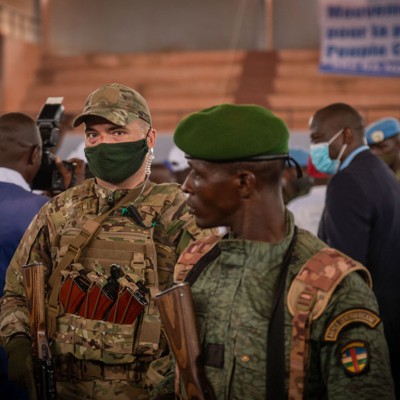
Näin. Jostain syystä Kongon Demoraalisen sisällissodassa '97 Ugandan armeija (Museveni on samojen watussien eli tutsien jälkeläisiä kuin Kagame) löysi Ruandasta sinne paenneita hutu interhamwoja eniten kulta- ja timanttikaivosten läheltä.
Russia’s Mercenaries Don’t Want to Control Africa. They Want to Loot It
U.S. policymakers should focus less on what the mercs are doing on the continent than what the United States could do.www.defenseone.com
Ethiopian paramilitaries have carried out a campaign of ethnic cleansing in Tigray, forcing hundreds of thousands of people from their homes using threats, killings and sexual violence, according to a joint report by Human Rights Watch and Amnesty International.
The rights groups accuse officials and paramilitaries from the neighbouring Amhara region of war crimes and crimes against humanity in western Tigray, in northern Ethiopia.
“Since November 2020, Amhara officials and security forces have engaged in a relentless campaign of ethnic cleansing to force Tigrayans in western Tigray from their homes,” said Kenneth Roth, director of HRW.
According to the report, militias from Amhara joined the Ethiopian armed forces and its allies to seize western Tigray in the first few weeks of the war, using indiscriminate shelling and execution to force people to leave.
The report said these forces also put up signs in towns demanding that people leave and made threats to kill civilians who wanted to stay.
The report said government forces were complicit in the alleged crimes. “Ethiopian authorities have steadfastly denied the shocking breadth of the crimes that have unfolded and have egregiously failed to address them,” said Roth.
The report cited a woman who said she had been raped by soldiers. She said they had told her they were trying to wipe out Tigrayans and were “purifying your blood”.

The head of the World Health Organization (WHO) has criticised the global community’s focus on the war in Ukraine, arguing that crises elsewhere, including in his home country of Ethiopia, are not being given equal consideration, possibly because the people affected are not white.
Dr Tedros Adhanom Ghebreyesus questioned whether “the world really gives equal attention to Black and white lives” given that ongoing emergencies in Ethiopia, Yemen, Afghanistan and Syria had garnered only a “fraction” of the concern for Ukraine.
Last month Tedros said there was “nowhere on Earth where the health of millions of people is more under threat” than Ethiopia’s Tigray region.
Since a truce was declared in Tigray three weeks ago, about 2,000 trucks should have been able to bring food, medicines and other essentials to the conflict-ridden area, he said during a virtual press briefing from Geneva on Wednesday. Instead, only about 20 trucks had arrived, he said.
“As we speak, people are dying of starvation,” said Tedros, a former health minister in Ethiopia and an ethnic Tigrayan. “This is one of the longest and worst sieges by both Eritrean and Ethiopian forces in modern history.”

Jaha. Rasismiahan se.
WHO chief blames racism for greater focus on Ukraine than Ethiopia
Tedros Adhanom Ghebreyesus says world ‘is not treating the human race the same way’ amid Tigray crisiswww.theguardian.com
Clashes between rival groups in Sudan’s Darfur killed at least 168 people on Sunday, an aid group has said, in the latest bout of deadly violence to hit the restive region.
Darfur, which was ravaged by civil war that erupted in 2003, has seen a spike in deadly conflict since October last year triggered by disputes mainly over land, livestock and access to water and grazing.
The latest fighting began on Friday in the Krink region of West Darfur, said Adam Regal, spokesman for the General Coordination for Refugees and Displaced in Darfur, an independent aid group. “At least 168 people were killed on Sunday and 98 wounded,” said Regal, voicing fears that the death toll could rise.
The violence broke out when armed tribesmen attacked villages of the non-Arab Massalit minority in retaliation for the killing of two tribesmen, the aid group said.
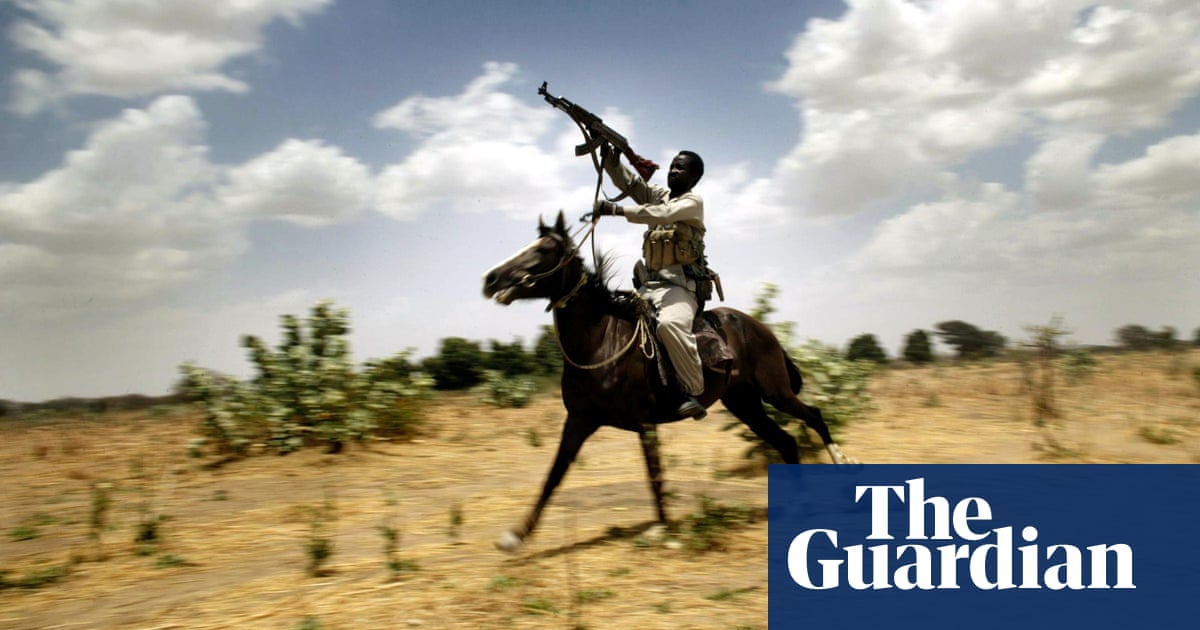
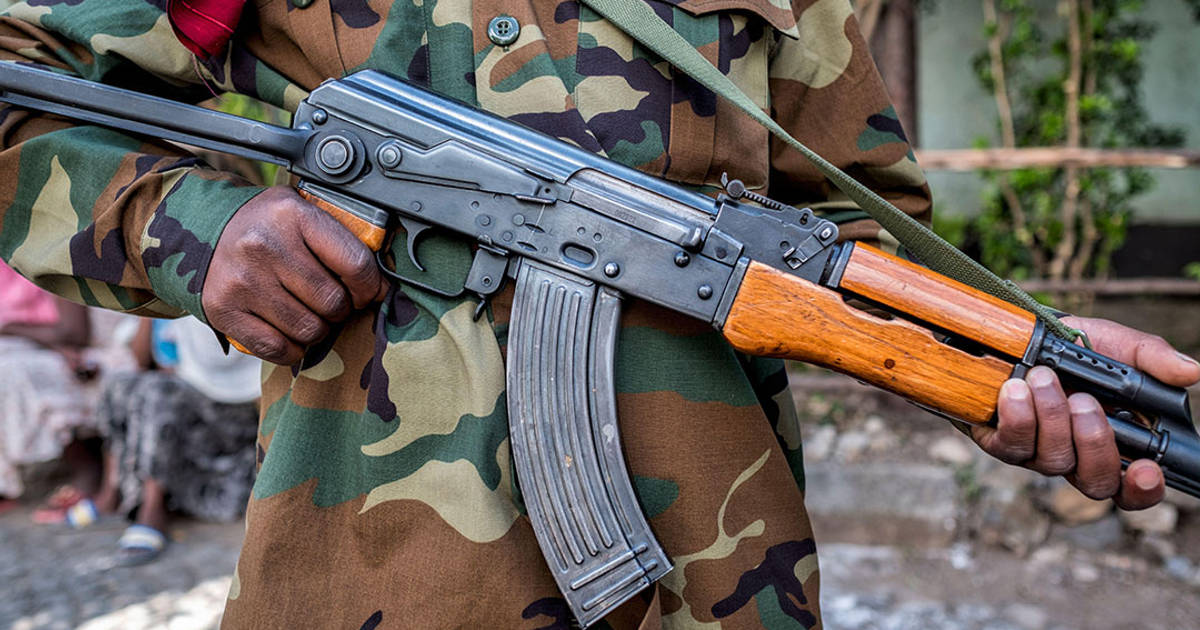
President Joe Biden has ordered the reestablishment of a US troop presence in Somalia to help local authorities combat the Al-Shabaab militant group, a senior American official told reporters Monday.
The move reverses an order from Biden's predecessor Donald Trump, who in late 2020 pulled nearly all US forces from the East African nation as he sought to wind down US military engagements abroad during his final weeks in office.
Biden "approved a request from the Defense Department to reposition US forces in East Africa in order to reestablish a small persistent US military presence in Somalia," the official said.
Fewer than 500 troops will be involved, the official said, adding that it will "take a little bit of time to reach that" level in Somalia.
That is slightly smaller than the original footprint of 750 US soldiers who spent years in the country conducting operations against Al-Shabaab, but were then removed under Trump and rebased in neighboring countries Kenya and Djibouti.
In December 2020, just before he left office, Trump directed the withdrawal from Somalia "against the advice of senior US military leadership," the official said.
"Since then Al-Shabaab... has unfortunately only grown stronger," the official added.
African civil society groups have accused the United Nations of inaction over atrocities in Ethiopia, warning in a letter that it had not learned the lessons of the 1994 Rwanda genocide and that the “situation risks repeating itself in Ethiopia today”.
Tens of thousands of people are thought to have been killed and millions more displaced since war broke out between Ethiopia’s federal government and the Tigray People’s Liberation Front (TPLF), the ruling party of the country’s northern region, in November 2020.
All of the parties in the war have been accused of crimes including arbitrary killings, mass rape and torture, while ethnic Tigrayans across the country have been subject to mass arrests amid a spike in hate speech, which has seen the prime minister, Abiy Ahmed, refer to the Tigrayan rebels as “weeds” and “cancer”.
In the letter to the UN secretary general, António Guterres, 12 African civil society groups including the Kampala-based Atrocities Watch Africa, the Institute for Human Rights and Development in Africa and Nigeria’s Centre for Democracy and Development called on him to “provide leadership in ending the ongoing war in Ethiopia”.
“Twenty-eight years ago, the security council similarly failed to recognise the warning signs of genocide in Rwanda or act to stop it,” the signatories said, adding: “We are concerned that the situation is repeating itself in Ethiopia today. We call on you to learn the lessons from Rwanda and act now.”
In November 2021, the UN security council issued a statement expressing concern over the fighting, but it has yet to take any concrete steps towards resolving the conflict.
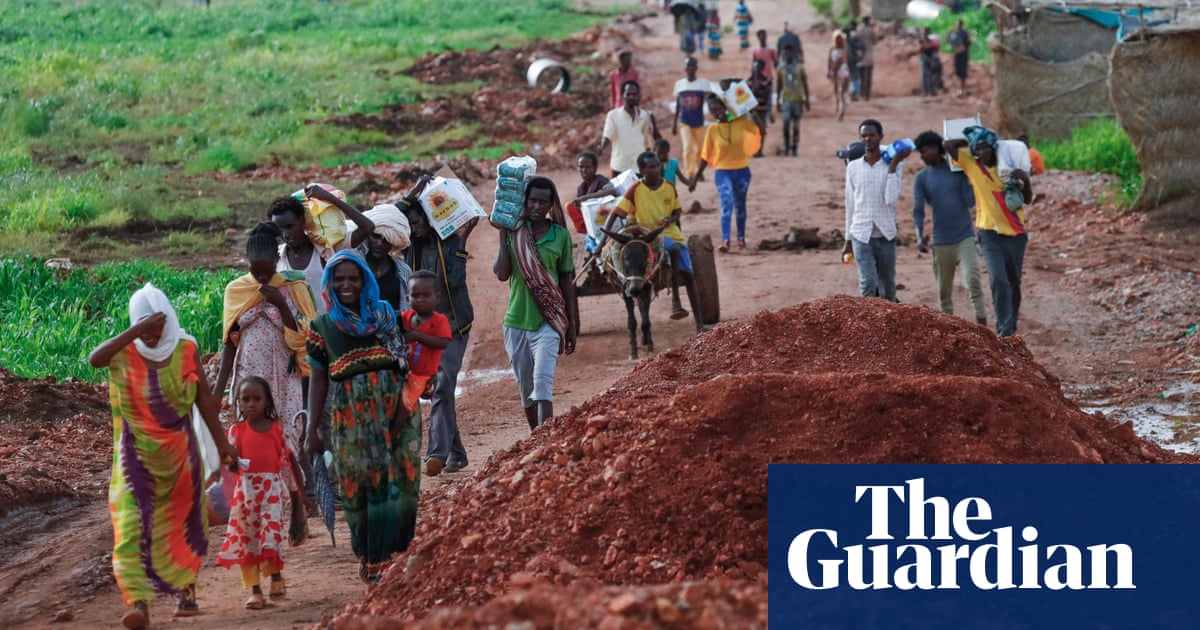
Suspected jihadists killed six soldiers and wounded 14 others in an attack on a military post in southeast Niger near the border with Chad, the defence ministry said late Tuesday.
The ministry statement read on public radio also mentioned "17 dead on the enemy side" and said "arms and ammunition were recovered by the armed forces combing the area" following the early Tuesday attack in Blabrine, in the Diffa region.
The "provisional report" from the ministry did not identify the attackers, but Niger has faced regular attacks by jihadists from Boko Haram and the Islamic State West Africa Province group.
According to the ministry, the attack was carried out from the night of July 4 to July 5 at around 1:00 am but the response from the soldiers "allowed the attack to be repelled and the enemy routed".
It was the second attack in three days in southeast Niger's Diffa region, which borders Chad and Nigeria. A Boko Haram assault on Sunday in Garin Dogo near the border with Nigeria left one soldier dead.
Blabrine borders Chad and its military base has been targeted several times since 2015.
In May 2020, 12 soldiers were killed and 10 wounded during an attack there blamed on Boko Haram, according to an official report.
Just months earlier, in late October 2019, 12 soldiers were killed and eight wounded in an attack on the same base.
During a visit to Garin Dogo at the end of June, President Mohamed Bazoum hailed progress in the fight against Boko Haram and Islamic State West Africa Province jihadists, saying: "We are winning this war."
The Diffa region is home to 300,000 Nigerian refugees and internally displaced people, driven out by jihadist abuses, according to the United Nations.
In the west, Niger also faces Sahelian jihadist groups including the Islamic State in the Greater Sahara. Attacks targeting civilians and soldiers there are regular and bloody.
